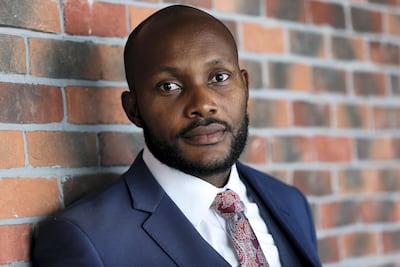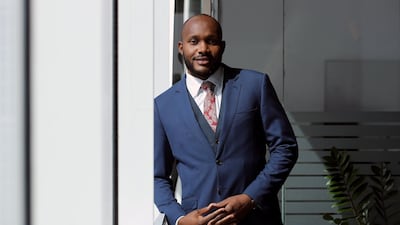Samson Ogbu is a UAE partner at SmartPA, which supports businesses with skilled virtual assistants that enable them to manage crucial tasks remotely and close staffing skills gaps.
Born in Nigeria, Mr Ogbu moved to Dubai nine years ago to complete his MBA in finance and marketing – having previously studied in the US – and landed a job. He joined SmartPA last year.
Now 39, he lives in Jumeirah Village Circle with his two sons, aged six and eight months, and his wife, an economist.
How did your upbringing shape your attitude towards money?
My parents separated when I was two/three, and dad passed away when I was 11. My older brother and I were raised by our mum. I learned to be independent. Mum’s a big influence as she started a small trading business that grew into something substantial. She’s the definition of hard work. We got a good education off the back of her effort and we’ll always be grateful.
We’d go to her workplace and see how cashflow was managed. We used to count the money physically, escort mum to the bank and pay the distributor. I was around 13. That taught me to understand the cycle, discipline and how to manage money.
How much were you paid in your first job?
I studied pharmacy in Nigeria, but at some point the lecturers were on strike. A high school took me on to teach mathematics three times a week, for about three months. I was 20 years old and paid about Nira 2,000 (equivalent to Dh29 today) monthly. It gave me my first exposure to speaking in public and honed my communication skills.
Aged 23, I worked as a hospital pharmacist for a while, for Nira 6,000. It wasn’t a lot but I had purchasing power and saved. I went on to work at a pharmaceutical company and then set up my own healthcare consultancy business. I would buy (drug supplies) from distributors and sell to remote hospitals. I had cashflow issues and quickly realised I was lacking business skills. That inspired me to get an MBA.
Are you a saver or a spender?
I’m a saver, but all my saving is driven by an investment goal. And then, off the back of that investment, I can spend on things I’m passionate about.
I have a cost template spreadsheet built to manage my finances. I can tell what I spend in every category: personal and family, groceries, social and travel. I fill out those expenditures every day. I never impulse buy and I know how my cost of living changed when I had kids.
How do you save?
I have a lower risk/medium return portfolio and then a relatively higher risk/higher return portfolio. I buy property and land because the risk is low and long-term return can be higher. My medium risk to higher return would be stocks and business. I manage my stock portfolio using Trade Station. I don’t speculate, I buy and keep for a long time. I even keep my emergency fund in my stock portfolio because I can liquidate it relatively quickly.
What has been your best investment?
My MBA. I apply the thought processes every day and it gave me a diverse network of business professionals all over the world: my classmates.
Tuition cost $60,000 (Dh220,392) and living costs $20,000 to $30,000, partly in Boston and then Dubai. It took me a few years to pay off the loan, but I got a lot of value from that.

What is your most cherished purchase?
A villa in Lagos, the largest city in Africa. It’s almost doubled in price and rental income is really good. I also bought land in my home city, Enugu, and the property where I live in Dubai, a two-bedroom apartment. I looked at how much I spent on rent – more than a mortgage – and it didn’t make sense.
Do you have a philosophy on money?
Money is just a means to an end. That end for me is security for my family and the future, and empowerment for people around me. Money itself has no value, it’s what you do with it.
Do you have an example?
I knew a Nigerian who was security at the first company I worked for here. He wanted to get a qualification to apply for an HSE officer job, but couldn’t afford it (Dh4,500) on his salary of around Dh900. If he passed this exam, it could change his life completely, so I put that money together in 2013. He studied, passed the exam and now works with an oil company.
Is there anything you regret purchasing?
A small house in Buffalo, New York. I had a bad tenant who wasn’t paying rent. I got fed up and realised it was a bad investment. I put it on the market, sold it at a loss, but the lessons I got are valuable; when it comes to investment, due diligence is a must, and it pays to ask the right questions of the right people. I bought in 2014 and sold in 2016.
Has the pandemic impacted SmartPA?
We’ve seen an uptick in business. Last year and the early part of this year, I was spending a lot of time educating businesses on the model we offer. Virtual assistants and remote work is not well established here, so some didn’t get it. When the pandemic came, a lot of prospects started getting back in touch. Some businesses had to let go of staff and had cashflow issues, so it was a good fix because they can engage us when they have business and when they don’t, they can stop the subscription. It makes sense as businesses are trying to control costs.
So, you can save companies money?
Absolutely. With any full-time employee, as an employer, you pay for some downtime and in a market like the UAE, you have visa costs. What we’ve done is take people’s competence and make them available when businesses need them; a pool of 250 professionals working for you on a subscription.
Do you plan for the future?
My aspiration by the time I hit 45 is to pursue the passions I have: empowering people. I want to have accomplished a level of financial freedom where I no longer need to be fully engaged with an active career, to get to the point where my asset income is much more than my cost of living. I can move on to do other things that create more impact.
Does that mean helping good causes?
I’m not a big believer in just donating money, but in actually working with people to educate them; once they have that base, they can do anything. Before Covid-19, I would go to Nigeria at least once a year, help people with school fees here and there.
I still remember the teacher that made an impact on my life and made me good at maths. So, at my old primary school, I’m working to have a programme to reward good teachers and support students struggling with fees. I want to get to that point where it becomes full-time. A little money here and there turns people’s lives around.

